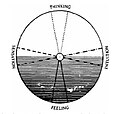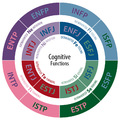Jungian cognitive functions
Jungian Cognitive Functions are a foundational concept in the psychological typology developed by Carl Gustav Jung. These functions are central to Jung's theory of personality, as outlined in his work Psychological Types. Jung proposed that individuals experience the world using four primary psychological functions: thinking, feeling, sensation, and intuition. Each function can be further divided into an introverted or extraverted orientation, leading to a total of eight distinct cognitive functions. These functions are believed to influence an individual's behavior, decision-making process, and overall psychological makeup.
Overview of the Functions
The four primary functions are divided into two categories: rational (judging) functions and irrational (perceiving) functions. The rational functions are thinking and feeling, while the irrational functions are sensation and intuition.
Thinking
Thinking is a function that involves making decisions based on logical analysis and objective considerations. It is concerned with the truth and principles of a situation.
- Introverted Thinking (Ti) focuses on internal frameworks and consistency.
- Extraverted Thinking (Te) emphasizes external organization and efficiency.
Feeling
Feeling is a decision-making process based on values and subjective evaluation of worth.
- Introverted Feeling (Fi) centers on personal values and authenticity.
- Extraverted Feeling (Fe) is oriented towards harmony and the values of the group or society.
Sensation
Sensation refers to the perception of physical stimuli and the details of the present moment.
- Introverted Sensation (Si) relies on past experiences and the subjective perception of sensory details.
- Extraverted Sensation (Se) seeks out new experiences and is attuned to the physical environment.
Intuition
Intuition is the perception of possibilities, insights, and patterns not immediately visible to the senses.
- Introverted Intuition (Ni) focuses on internal insights and visions, often concerning future implications.
- Extraverted Intuition (Ne) explores new ideas and the potential in the external world.
Jung's Typological Model
Jung's typological model suggests that individuals have a dominant function, which plays a primary role in their personality, along with an auxiliary function that supports and balances the dominant. The less developed functions can also influence behavior, particularly under stress or in unfamiliar situations.
Applications and Influence
Jung's theory of cognitive functions has influenced various areas of psychology, including personality assessment and counseling. The most notable application is the Myers-Briggs Type Indicator (MBTI), which categorizes individuals into 16 personality types based on their preferences in using these functions.
Criticism and Controversy
While Jung's cognitive functions have been influential, they have also faced criticism for their lack of empirical evidence and scientific rigor. Critics argue that the theory is too subjective and lacks the predictive validity of other psychological models.
See Also
This article is a psychology-related stub. You can help WikiMD by expanding it!
Transform your life with W8MD's budget GLP-1 injections from $125.
W8MD offers a medical weight loss program to lose weight in Philadelphia. Our physician-supervised medical weight loss provides:
- Most insurances accepted or discounted self-pay rates. We will obtain insurance prior authorizations if needed.
- Generic GLP1 weight loss injections from $125 for the starting dose.
- Also offer prescription weight loss medications including Phentermine, Qsymia, Diethylpropion, Contrave etc.
NYC weight loss doctor appointments
Start your NYC weight loss journey today at our NYC medical weight loss and Philadelphia medical weight loss clinics.
- Call 718-946-5500 to lose weight in NYC or for medical weight loss in Philadelphia 215-676-2334.
- Tags:NYC medical weight loss, Philadelphia lose weight Zepbound NYC, Budget GLP1 weight loss injections, Wegovy Philadelphia, Wegovy NYC, Philadelphia medical weight loss, Brookly weight loss and Wegovy NYC
|
WikiMD's Wellness Encyclopedia |
| Let Food Be Thy Medicine Medicine Thy Food - Hippocrates |
Medical Disclaimer: WikiMD is not a substitute for professional medical advice. The information on WikiMD is provided as an information resource only, may be incorrect, outdated or misleading, and is not to be used or relied on for any diagnostic or treatment purposes. Please consult your health care provider before making any healthcare decisions or for guidance about a specific medical condition. WikiMD expressly disclaims responsibility, and shall have no liability, for any damages, loss, injury, or liability whatsoever suffered as a result of your reliance on the information contained in this site. By visiting this site you agree to the foregoing terms and conditions, which may from time to time be changed or supplemented by WikiMD. If you do not agree to the foregoing terms and conditions, you should not enter or use this site. See full disclaimer.
Credits:Most images are courtesy of Wikimedia commons, and templates, categories Wikipedia, licensed under CC BY SA or similar.
Contributors: Prab R. Tumpati, MD


